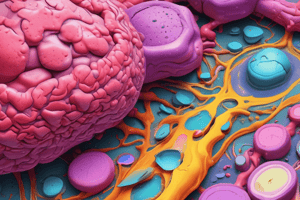Podcast
Questions and Answers
Modern tıpta hangi unsurların anlaşılması önemlidir?
Modern tıpta hangi unsurların anlaşılması önemlidir?
- Tarihsel gelişmeler
- İnsan biyolojisi ve anatomisi (correct)
- Hayvan çeşitliliği
- Bitki büyüme koşulları
Tıp alanında patolojinin rolü nedir?
Tıp alanında patolojinin rolü nedir?
- Modern tedavi yöntemlerini geliştirmek
- Vücut dokularını ve sıvılarını inceleyerek hastalıkların nedenlerini belirlemek (correct)
- Hastalıkları önlemek için çalışmalar yapmak
- Çeşitli hastalıkları tedavi etmek
Hangisi tıbbın temel taşlarından biri değildir?
Hangisi tıbbın temel taşlarından biri değildir?
- İlaç isimleri sözlüğü (correct)
- Hippokrat Yemini
- İnsan anatomisi
- Bilimsel yöntemlerle tanı ve tedavi
Hangisi tıbbın evrimi hakkında doğru bir ifade değildir?
Hangisi tıbbın evrimi hakkında doğru bir ifade değildir?
Tıpta hangi gelişmeler teşhis kapasitelerini devrim yapmıştır?
Tıpta hangi gelişmeler teşhis kapasitelerini devrim yapmıştır?
Hangisi patolojinin ana konularından biri değildir?
Hangisi patolojinin ana konularından biri değildir?
Patoloji alanında hangi iki ana branş bulunmaktadır?
Patoloji alanında hangi iki ana branş bulunmaktadır?
Patoloji nedir?
Patoloji nedir?
Hangisi patolojinin görevlerinden biri değildir?
Hangisi patolojinin görevlerinden biri değildir?
Histopatoloji hangi tür vücut örneklerini incelemek için kullanılır?
Histopatoloji hangi tür vücut örneklerini incelemek için kullanılır?
'Robbins & Cotran Patologic Basis of Disease' kitabı ne hakkında bilgi sağlar?
'Robbins & Cotran Patologic Basis of Disease' kitabı ne hakkında bilgi sağlar?
Klinik patoloji hangi tür vücut sıvılarının analizinde uzmanlaşmıştır?
Klinik patoloji hangi tür vücut sıvılarının analizinde uzmanlaşmıştır?
Flashcards are hidden until you start studying
Study Notes
Introduction to Medicine and Pathology
Medicine is a field of study focused on maintaining health and treating diseases through the diagnosis, treatment, and prevention of illnesses. It encompasses various specialties and disciplines, including pathology—a crucial aspect within medicine that involves examining body tissues and fluids to determine causes of disease or abnormalities. In this article, we will delve into the fascinating world of medicine, exploring its foundations, key concepts, and the role of pathology within it.
Foundational Concepts in Medicine
The practice of medicine has evolved over centuries, with its roots dating back thousands of years. One of the earliest recorded medical texts dates to around 2700 BCE, known as the Ebers Papyrus from Ancient Egypt. Important figures such as Hippocrates have made significant contributions to the development of medicine, laying down fundamental principles like the Hippocratic Oath that guides physicians' interactions with their patients even today.
Key elements of modern medicine include understanding human biology and anatomy, as well as scientific methods in diagnosing and treating disorders. Technological advancements have also played a pivotal role in shaping the discipline, allowing for more accurate assessments and interventions. For instance, developments in imaging techniques like X-rays, CT scans, and MRIs have revolutionized diagnostic capabilities.
Moreover, the concept of evidence-based medicine emerged in the mid-to-late 20th century. This approach emphasizes the use of rigorous scientific data rather than personal opinions when making decisions related to patient care. Evidence-based medicine has become a cornerstone of contemporary healthcare practices.
Understanding Pathology
Pathology, often referred to as the 'science behind the art of healing', deals specifically with the analysis of bodily structures to identify diseases or other deviations from normal function or appearance. Essentially, it provides answers to questions about what goes wrong with the body in disease states, how these changes occur, and why they develop.
There are two main branches within pathology: histopathology and clinical pathology. Histopathology focuses on the microscopic examination of cells and tissue samples removed during surgical procedures, providing insights into tumor progression and metastasis, inflammation, and infection processes involved in diseases. Clinical pathology, on the other hand, concentrates on analyzing blood, urine, spinal fluid, and transplant organs using specialized laboratory tests to detect abnormalities in cell count, chemical composition, or organ function. Both aspects play critical roles in supporting the overall management of patients by enabling early detection of conditions, guiding therapeutic strategies, and monitoring responses to treatments.
One example of a classic textbook used to teach pathology is Robbins & Cotran Pathologic Basis of Disease, which outlines typical presentations of diseases in terms of their gross and microscopic appearances, etiologies, and underlying mechanisms. Such resources serve as valuable tools for students, clinicians, and researchers alike who seek deeper insight into specific pathologic entities.
In summary, while the practice of medicine covers a wide spectrum of activities aimed at promoting health and managing illness, pathology serves as a vital component within this realm. By providing essential information about the nature and mechanisms underpinning disease processes, pathologists contribute significantly to the effective diagnosis and treatment of patients.
Studying That Suits You
Use AI to generate personalized quizzes and flashcards to suit your learning preferences.




